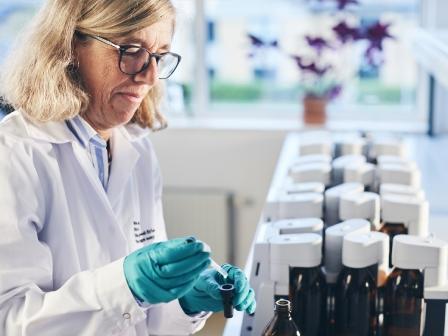Investigating the biodegradability and toxicity of different wastewaters and chemicals, biological activity in different types of biomass, and methane potential in biogas substrates.

The AnoxKaldnes laboratory offers a unique combination of quality assured biological batch tests and deep knowledge of the process microbiology behind the tests.
We deliver high quality results that can be used to fulfill regulatory requirements and help with interpretation and scaling up of results.
Note: Poor degradation or signs of toxicity in a batch test does not necessarily mean that the wastewater is not biologically treatable. In some cases, a strongly specified micro flora is needed for degradation and continuous bench-scale simulations are required to evaluate the long-term treatability.
BIODEGRADATION TESTS
Assessing the fate of organic compounds in wastewater treatment plants and the environment
Biodegradation tests are tools to quantify the biodegradability of different wastewater streams or specific chemical compounds. The results are important in wastewater treatment design. The tests are also essential in proving the fulfillment of regulatory requirements, and need to be performed by a certified laboratory, such as the AnoxKaldnes laboratory.
There are many different standardized biodegradation tests to choose from. The choice depends on the purpose of the test and the properties of the test item. Read more in the link below and please contact us for consultation regarding choice of method.
The AnoxServices accredited laboratory performs the following Biodegradation Tests:
- OECD 302 B/SS-EN ISO 9888:1999: Inherent Biodegradability Test (accredited) – Die-away measurements of DOC (as standard) or COD (upon request). This test is also called Zahn-Wellens test or EMPA-Test
- OECD 301 A/SS-EN ISO 7827:1996: Ready Biodegradability Test (accredited) – Die-away measurements of DOC (as standard) or COD (upon request).
- OECD 301 F//SS-EN ISO 9408:2000: Ready Biodegradability Test (accredited) – Respirometric analysis
- OECD 306: Saltwater biodegradation tests.
TOXICITY TESTS
Evaluate the toxicity of your wastewater
Toxicity tests evaluate the effect that different concentrations of a pollutant or complex wastewater has on microorganisms that are responsible for wastewater treatment.
Our standardized toxicity tests focus on heterotrophic aerobic bacteria or nitrifying bacteria:
- SS-EN ISO 9509 - Inhibition of nitrification (accredited)
- VKI - Screening method for inhibition of nitrification (developed by the Danish Water Quality institute - VattenKvalitet Institutet), described in SNV report 4424. performed in closed vessels suitable for volatile and foaming substances.
- SS-EN ISO 8192 - Inhibition of heterotrophic aerobic respiration (accredited)
We also perform tailor-made inhibition tests focusing on other microbiological groups such as anammox bacteria, denitrifying bacteria, and methanogenic archaea.
BIOLOGICAL ACTIVITY TESTS
Assessing and understanding the performance of a wastewater treatment plant when removing specific contaminants
Biological activity tests analyze the degree and rate at which the compounds and contaminants of concern are removed by microbial populations.
These tests can be performed regarding heterotrophic respiration, nitrification (ammonia removal), ammonium-oxidizing bacteria (AOBs), nitrite-oxidizing bacteria (NOBs), denitrifying bacteria, anaerobic ammonium-oxidizing organisms (anammox) and Micropollutant-removing organisms.
We perform activity tests on activated sludge and biofilm (AnoxKaldnes™ MBBR carriers) at the AnoxKaldnes laboratory.
BIOCHEMICAL METHANE POTENTIAL (BMP) TESTS
Biochemical Methane Potential (BMP) tests are used to assess the potential methane production by anaerobic degradation of specific substrates or wastewater streams.
SENDING SAMPLES
Please fill out a delivery note thoroughly (see Link section below)
Avoid sending samples the day before a weekend or a holiday.
Contact us to discuss choice of method and required sample volumes for biodegradation tests and activity tests.
Samples for standardised inhibition/toxicity tests can be sent directly without consultation, required volume: 1 L
Please ensure that samples are well packaged to avoid any leakage, follow instructions in the doc below (see link section).
Contacts




